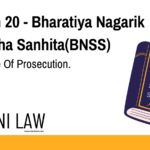Code
(1) Subject to the other provisions of this Sanhita, the powers and duties of a Judge or Magistrate may be exercised or performed by his successor-in-office.
(2) When there is any doubt as to who is the successor-in-office, the Sessions Judge shall determine by order in writing the Judge who shall, for the purposes of this Sanhita or of any proceedings or order thereunder, be deemed to be the successor-in-office.
(3) When there is any doubt as to who is the successor-in-office of any Magistrate, the Chief Judicial Magistrate, or the District Magistrate, as the case may be, shall determine by order in writing the Magistrate who shall, for the purpose of this Sanhita or of any proceedings or order thereunder, be deemed to be the successor-in-office of such Magistrate.
Explanation
This section deals with the continuation of powers and duties of a Judge or Magistrate upon their transfer or replacement. It ensures that the smooth functioning of the judicial process is not disrupted due to changes in personnel.
Illustration
Imagine a Judge presiding over a trial. Before the trial is complete, the Judge is transferred to a different court. Section 29 clarifies that the new Judge in the original court becomes the “successor-in-office” and can continue the trial.
Common Questions and Answers: on Powers Of Judges And Magistrates Exercisable By Their Successors-In-Office
Q: What if there is a dispute about who the successor-in-office is?
A: The Sessions Judge (for Judges) or the Chief Judicial Magistrate/District Magistrate (for Magistrates) will determine the successor-in-office through a written order.
Q: How does this section ensure continuity in the judicial process?
A: By allowing the successor-in-office to exercise the powers and duties of the previous Judge or Magistrate. This way, it prevents delays and interruptions in court proceedings.







